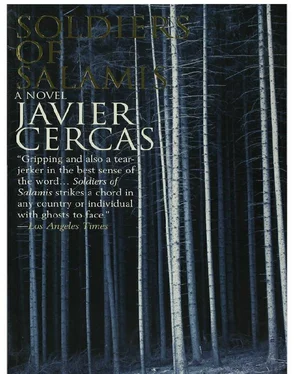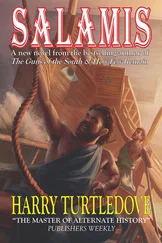There's a page missing here, which has been torn out. But the text goes on:
. . proximity of front line kept me hidden in their house until the Nationalist troops arrived.
4. that despite the generous objection of the inhabitants of the Borrell farm I wish by means of this document to confirm my promise to repay them with a substantial monetary reward, proposing the proprietor [here there is a blank space] for an honorary distinction if the military command is in agreement and to swear my immense and eternal gratitude to him and his family, all of which will be very little in comparison to what he has done for me.
Signed in the Casanova de un Pla farm near Cornellá de Terriat 1. .
That was the contents of the notebook. I reread it several times, trying to give those dispersed notes a coherent meaning, and link them to the facts I knew. To begin with, I discarded the suspicion, which insidiously crossed my mind as I read, that the notebook was a fraud, a falsification contrived by the Figueras family to deceive me, or to deceive someone: at the time I thought it didn't make much sense that a modest rural family would concoct so sophisticated a scheme. So sophisticated and, most of all, so absurd. Because, when Sánchez Mazas was alive, when it could have been a shield for defeated people against the reprisals of the victors, the document could easily have been authenticated and, once he was dead, it lost its value. Nevertheless, I thought that it would be a good idea to make sure the handwriting in the notebook (or one of the handwritings in the notebook, because there were several) and that of Sánchez Mazas were the same. If that were the case (and nothing led me to believe it wasn't), Sánchez Mazas was the author of the little diary, which had undoubtedly been written during the days he spent wandering in the forest, or at most very shortly afterwards. To judge by the last text in the notebook, Sánchez Mazas knew the date of the execution had been 30 January 1939; in any case the numeration preceding each entry of the diary corresponded to the days of the month of February of the same year (the Nationalists had indeed taken Gerona on 4 February). From the text of the diary I deduced that, before availing himself of the protection of the Figueras brothers and Angelats, Sánchez Mazas had found a more or less secure refuge in a house in the area, and this house could be none other than the Borrell house or farm, whose inhabitants he thanked and promised a 'substantial monetary reward' and 'an honorary distinction' in the long final declaration, and I also deduced that this house or farm must be in Palol de Rebardit — a municipality bordering on Cornellá de Terri — and that its inhabitants could only be the Ferré family, one of whom was sure to be Maria Ferré, who, as Jaume Figueras had told me at the sudden end of our interview in the Núria, was still alive. All of the above seemed obvious, just as, once fitted together, the place for each piece of a jigsaw puzzle seems obvious. As far as the final declaration went, drawn up in the Mas de la Casa Nova, the place in the forest where the four fugitives had stayed hidden — and undoubtedly when they knew themselves to be safe — it also seemed obvious that it was a way of formalizing Sánchez Mazas' debt to those who'd saved his life, like a safe-conduct enabling them to cross the uncertainties of the immediate post-war period, without having to undergo each and every one of the outrages reserved for the majority of those who, like the Figueras brothers and Angelats, had swelled the ranks of the Republican army. I found it strange, however, that one of the pages torn out of the notebook should be precisely the one containing the declaration in which, it could be inferred, Sánchez Mazas expressed his gratitude to the Figueras brothers and Angelats. I wondered who had torn out that page. And why. I wondered who had torn out the first pages of the notebook, and why. Since every question leads to another, I also wondered — in fact I'd already been wondering this for quite a while — what really happened during those days that Sánchez Mazas wandered aimlessly through the forest in no man's land. What did he think about, what did he feel, what did he tell the Ferrés, the Figueras brothers, Angelats? What did they remember him having told them? And what had they thought and felt? I was yearning to talk to Jaume Figueras' uncle, to Maria Ferré and Angelats, if he were still alive. I told myself, even if Jaume Figueras' tale couldn't be considered trustworthy (or couldn't be considered any more trustworthy than Ferlosio's), for its veracity didn't depend on a memory (his), but on the memory of a memory (his father's) — the accounts of his uncle, Maria Ferré and Angelats (if he was still alive) were on the other hand firsthand reports and therefore, at least at first, much less random than his. I wondered if those tales would fit the reality of events or whether, perhaps inevitably, they'd be varnished with that gloss of half-truth and fibs that always augment an episode now distant and perhaps legendary to its protagonists, so that what they might tell me had happened wouldn't be what really happened or even what they remembered happening, but what they remembered telling before.
Overwhelmed with questions, sure that I'd be lucky if I didn't have to wait more than a month before talking to Figueras' uncle as if walking over sand dunes and needing to step on terra firma 1 called Miquel Aguirre. It was a Monday and it was very late, but Aguirre was still awake and, after telling him about my interview with Jaume Figueras, about the latter's uncle and about Sánchez Mazas' notebook, I asked him if it were possible to obtain documentary proof that Pere Figueras, Jaume's father, had indeed been in prison after the end of the war.
'Couldn't be easier,' he answered. 'In the City Archives there's a register of all the names of every single person who's been imprisoned since before the war. If Pere Figueras was in jail, his name will be there. For sure.'
'Couldn't they have sent him to another prison?'
'Impossible. Everyone detained in the Banyoles area was sent to Gerona prison.'
The next day, before going to work at the newspaper, I presented myself at the City Archives, which were located in a renovated convent, in the old part of the city. Following the signs, I went up a stone stairway and entered the library, a spacious, sunny room, with big windows, gleaming wooden tables bristling with lamps, the silence of which was broken only by the typing of an employee almost completely hidden behind a computer. I told the clerk — a man with unruly hair and a grey moustache — what I was looking for; he stood up, went to a shelf and got down a ring binder.
'Look in here,' he said, handing it to me. 'Beside each name is a file number; if you want to consult one, let me know.'
I sat down at a table and looked through the index, which ran from 1924 to 1949, for a Figueras who'd been held in prison in 1939 or 1940. Since it's quite a common surname in the region, there were several, but none of them were the Pere (or Pedro) Figueras Bahi I was looking for: no one of that name had been in Gerona prison in 1939 or 1940, not even in 1941 or 1942, which was when, according to Jaume Figueras' tale, his father had been in jail. I looked up from the binder: the employee was still typing at his computer; the room was still deserted. Beyond the windows which were flooded with light was a confusion of decrepit houses which, I thought, wouldn't have looked much different sixty years and a few months before, when, in the final days of the war, a few kilometres away three anonymous lads and an illustrious man in his forties, hid and awaited the end of the nightmare. As if struck by a sudden realization, I thought: 'It's all a lie.' I reasoned that, if the first fact I attempted to confirm independently — Pere Figueras' time in prison — turned out to be false, nothing prevented me from supposing the rest of the tale to be equally untrue. I told myself that there had undoubtedly been three lads who helped Sánchez Mazas survive in the forest after the firing squad — a certainty supported by various circumstances, among them the coincidences between the notes in Sánchez Mazas' notebook and the tale he'd told his son — but certain clues lent credence to the suspicion that it wasn't the Figueras brothers and Angelats. First of all, in Sánchez Mazas' notebook their names had been written in ink and in a different handwriting from the rest of the text, which was in pencil; undoubtedly, then, a hand other than that of Sánchez Mazas had added them. Furthermore, the missing page of the final declaration where, as far as I could tell from studying the notebook, the Figueras brothers and Angelats should be mentioned, because he'd surely have expressed his gratitude for their help, could well have been torn out precisely because it didn't mention them, so that someone would come to the very conclusion that I had reached. And as far as Pere Figueras' false prison sentence goes, it would undoubtedly have been invented by Pere himself, or his son, or by who knows who; in any case, added to the proud refusal to evade captivity by appealing to the favours of a high Francoist dignitary like Sánchez Mazas, and the letter in which he denounced some unscrupulous person who tried to get money out of Sánchez Mazas by pretending to be him, the story amounted to ideal cement for building one of those legends of paternal heroism which — without anyone ever happening to identify their origins — so prosper at the death of a father in the kind of families inclined to their own mythogenesis. More disappointed than perplexed, I wondered who then were the real forest friends and who had fabricated that fraud and why; more perplexed than disappointed, I said to myself that maybe, as some had suspected from the beginning, Sánchez Mazas hadn't even been in Collell, and perhaps the whole story of the execution and the circumstances surrounding it were nothing but an immense swindle minutely plotted by Sánchez Mazas' imagination — with the voluntary or involuntary collaboration of relatives, friends, acquaintances and strangers — to cleanse his reputation as a coward, to hide some dishonourable episode in his strange wartime adventure and, most of all so that some credulous investigative reporter, avid for novelties, would reconstruct it sixty years later, redeeming him forever before history.
Читать дальше












